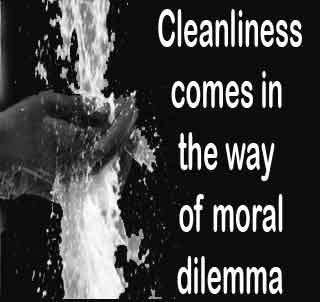
The research consisted of two experiments that were conducted on university students. The first experiment involved the students to finish scrambled sentences. This involved 40 sets of sentences of four words each. Underlining any three words would form a sentence.
One group of students had to form sentences from a list of neutral words, whereas the second group had to form sentences from a list of “pure†words, namely; “washedâ€, “cleanâ€, “pristineâ€, etc. among other words. They were then asked to rate a series of moral dilemmas, for example, to avoid starvation killing a terminally ill plane crash survivor, keeping money found in a wallet, etc.
Simone Schnall, the lead researcher said that, “When we exercise moral judgment, we believe we are making a conscious, rational decision, but this research shows that we are subconsciously influenced by how clean or ‘pure’ we feel. Take for example the situation of a jury member or voting in an election – if the jury member had washes their hands prior to delivering their verdict, they may judge the crime less harshly. Similarly, someone may find it easier to overlook a political misdemeanor had they performed an action that made them feel ‘clean’ prior to casting their vote.â€
For the second experiment the participants were showed a repelling video and again asked to rate the moral dilemmas. Half of the participants were asked to wash their hands before answering the questions, while the other half were not asked to wash their hands.
The results achieved from the experiments prove that somehow people, who felt clean, were lenient when passing a judgment, as compared to the other participants.
